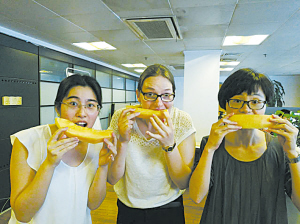 |
午休时间,同事们扮起了“吃瓜群众”。
(金晶 摄) |
When I chose to do my internship at Ningbo Daily it was clear, that I couldn′t really assist the editorial staff, because I can′t write or hold interviews in Chinese. But albeit I decided to do my prescribed abroad-internship at Ningbo Daily instead of a newspaper in Switzerland, Austria or the German-speaking part of Belgium, where I could have get more experiences for my future as a journalist - why? I think there are not that many differences between the named countries and Germany so it′s not really abroad. I wanted to experience something totally new and different, wanted to learn about the Chinese media market, the way journalist work at here and the structure in the office. I was especially in-terested how local journalism in such a big city works (for Germans already a city with more than 1 million inhabitants is really big). 当我选择了在宁波日报实习,我心里就很清楚:我并不能真正帮助编辑人员,因为我无法用中文采访或写作。但尽管如此,我依旧决定在宁波完成我的海外实习,而非瑞士、奥地利或比利时的德语区。也许(在常人看来),这些地方可以为我将来成为一名正式的记者储备更多的经验。但我认为,这些国家除了名字不叫德国之外,其他(跟德国)并没有太大区别,所以不能算是真正的海外实习。我希望有一些全新的体验。我想了解中国的媒体市场,知道记者在这里的工作方式,甚至是办公室的结构。我尤其感兴趣的是,地方新闻机构是如何在这样一个大城市里运作?(在德国,100万居民以上的城市绝对算大城市)。 In Germany I have just worked for one small department of Aachen Daily and for an online magazine at my university (www.pflichtlektuere.com), therefor I only have a little experience to compare the work of journalism in Germany and China. But comparing to this I must say the work is not "totally new and different". The daily work in general is equal in both countries: do some enquiry, have an interview (face to face or by phone), write an article. This is what characterizes a journalist′s profession. But I also noticed some differences. When I worked for Aachen Daily my interview partner who were adept in media often mentioned that I was not in a hurry and spent a long time to listen to them. The reason is understandable, because a huge number of newspaper journalists in Germany are not salaried, they are freelancers and are paid per article not per day. But nevertheless in my opinion some good topics often come from a casual conversation.When I was at Tiansheng farm with two of my collegues,the most interesting conversation with the farmer occured during drinking tea after lunch. Amongst others we talked about the problem to feed a worldwide raising population, about genetic engeneer-ing, it′s advantages and disadvantages for farmers. Most journalists who are working for a local newspaper in Germany wouldn′t have get in this situation, wouldn′t have had this talk, because they even would have leaved the farm before lunch to hurry to the next appointment. 在德国,我曾经在亚琛日报的一个部门,和大学里的一个在线杂志(www.pflichtlektuere.com)实习过,因此我有一些经验来比较两地新闻工作的不同。在这里,我必须说,这并不是“全新的体验”。两个国家的日常工作如出一辙:调查、采访(面对面或通过电话),再写一篇报道。这正是新闻记者的职业特征。 但我也注意到一些差异。我在亚琛日报工作的时候,那些有经验的同事经常指出我花费太多时间去倾听采访对象。原因显而易见,因为大量的德国报纸记者是不领固定工资的,他们是自由职业者,按篇计酬而不是按天。但在我看来,一些好的话题却常常是不经意间的灵光一现。比如当我和两个同事在天胜农场(采访)时,最有趣的谈话就是在餐后喝茶时发生的。其间,我们谈到了全球人口增加的问题、遗传工程给农民带来的利弊。而在德国,大多数地方报纸的记者或许根本没机会谈到这个,因为这时他们甚至已经离开农场,在午饭前赶去下一个约会。 Another thing I mentiond was a working style, which is a little different. In my experience most Germans try to finish their work as fast as possible and want to seperate work from private life. At Ningbo Daily I found another behaviour: work belongs to the life,the collegues have a team spirit, they are sharing food, stories, time and work. Nearly everyday somebody brought fruits or sweets for the whole office. In Germany just a very few collegues are friends, to others just an employer-employee relationship exists. I think this boost the team and in fact I really noticed more teamwork at Ningbo than at Aachen daily. 另一件事,我认为是工作方式的不同。以我的经验,大多数德国人试图尽可能快地完成工作,以求将工作和私人生活分开。但在宁波日报,我发现另一个行为:工作从属于生活,同事之间更有团队精神,他们分享零食、故事、闲暇时间以及工作。几乎每天有同事给整个办公室的人带来水果或糖果。但在德国,仅有很少的同事会成为朋友,其他人只是雇主与雇员的关系。我认为这种方式鼓舞了团队,事实上,我也注意到宁波日报比亚琛日报拥有更多的团队合作。 (翻译:单玉紫枫)
|